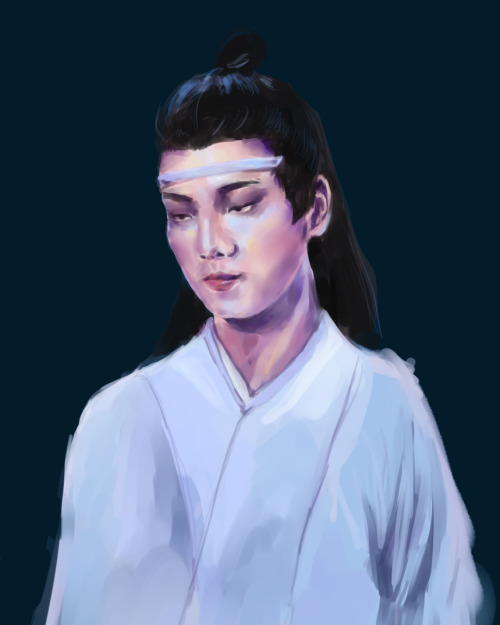Cql - Blog Posts












Lan Wangji + When Wei Wuxian is not looking at him
![The Untamed | Episode 35 [Being Flirty While Playing A Song Together]](https://64.media.tumblr.com/4b26a7590fc25f27c931842b92fd7e9b/73265c6370cb4912-f3/s500x750/e4e8e35798463b90b88dfbc628c629850d10b32f.gif)
![The Untamed | Episode 35 [Being Flirty While Playing A Song Together]](https://64.media.tumblr.com/fbed9da6ecba76e50ec6ce99cb4bc45d/73265c6370cb4912-3d/s500x750/289b13e90e4f5624931dde6124753313673d62ba.gif)
![The Untamed | Episode 35 [Being Flirty While Playing A Song Together]](https://64.media.tumblr.com/d088fbf7e9dfbbf36e8d083a74b04e29/73265c6370cb4912-8a/s500x750/5c5c92582c820c5bf763ff3af0703d8e81f4f085.gif)
![The Untamed | Episode 35 [Being Flirty While Playing A Song Together]](https://64.media.tumblr.com/5bababa69901b8837f44ef8b1f0a49b7/73265c6370cb4912-b7/s500x750/ab8676726873132bba718aab433e5fd796eeacf4.gif)
![The Untamed | Episode 35 [Being Flirty While Playing A Song Together]](https://64.media.tumblr.com/5f26b1fdf642dafcae8ca7f94b484a50/73265c6370cb4912-90/s500x750/857d1534fbbbb96a9549ffa724c5d6f23881ac47.gif)
The Untamed | Episode 35 [Being Flirty While Playing A Song Together]
⤳WangXian’s Favorite Scenes [7/∞]⬿
I've been obsessed with Jiang Cheng since halfway through my first watch of cql, and here's why. He always keeps doing better than I expect him to.
(wow, this got long. rest is under the cut!)
He's introduced as the brother-killer, the ruthless sect leader with a reputation for being merciless. Then cut to the flashback, a Jiang Cheng who is fifteen, surrounded by his sister and brother and happy about it, occasionally doing stupid teenager things, trying so very hard to be Ideal Heir, while Wei Wuxian is the prodigy that keeps stealing his thunder effortlessly. And you go, "oh, I know this story. It's a tragedy, because these brothers loved each other once, but one's ambition will eventually breed jealousy which will fester into hate and end, tragically, in the death of the better half." It's Cain and Abel! You've seen how it ends, it's the first scene you see, of course that's where it's going!
And then you see how the three siblings help each other survive a frankly horrible and abusive household. They try to do for each other what their parents couldn't; Yanli tries to be their mother, Jiang Cheng doesn't believe the rumours about Wei Wuxian being jfm's illegitimate son or hold it against him as he very easily could've learnt to from his mother, and Wei Wuxian does his darned best to get jfm to acknowledge and love his son as he does for Wei Wuxian.
You keep waiting for the other shoe to drop!! Yunmeng burns, Jiang Cheng chokes his brother in the rain, and you think this is it, this is where it finally breaks. But he sticks with his brother and sister, he makes some stupid decisions in his grief and pays dearly for it. When he wakes up without a core he is broken, his 'ambition' is destroyed, and you remember him choke his brother and think this is it, and then... it isn't. Other than the one grieving rant in the rain, he never blames his brother for their loss, never demands that he fix it all. When Wei Wuxian does come with a solution, Jiang Cheng doesn't act like it's something he was owed. It's his brother, his brilliant genius brother, who miraculously fixed this impossible thing! He's the most Jiang of them all, of course he achieved the impossible!
And then he's the young sect leader in a bloody war, needing to win, needing to prove his worth and his sect's worth at every turn. This is where he becomes the ruthless, powerful man we meet in the first few episodes! Only.... he finds Wen Qing, who is the enemy in the eyes of the Jianghu, and offers to protect her (only her because he knows his limits, he can't protect all her people and his own, and his duty to his sect is first). He goes looking for his brother, months on end, haggard to the bone.
Then Wei Wuxian shows up wielding a power that's the worst taboo in their world, a power frighteningly similar to the power-drunk villain that they war is being waged against! He's doing unspeakable things, terrible torture in the name of revenge! Ah, so this is what it finally is! The moment they finally fall out for good, where Jiang Cheng cannot abide to tarnish his sect's reputation with Wei Wuxian's, and their love turns to hate.
But.... Jiang Cheng sees what he's done, and the first thing he does is to hug him tight. He asks about Wei Wuxian not carrying his sword, but even after the diplomatic nightmare of a war council, Jiang Cheng is just worrying. It's the most open, the most honest we've seen him so far, and he is concerned for his brother. He shuts it down when Jin Zixun tries to pick a fight. He takes responsibility for the person everyone's wary of, because that's his brother and he trusts him! He's hiding things, yes, but one day he will be ready to talk and Jiang Cheng will wait till then.
Then the war's won (by Wei Wuxian, of course!) and he has a sect to rebuild. And his brother is not at his side. First he's slacking off and drinking around town, then he runs away with the Wens to the Burial Mounds. It's terrible for the sect's and Jiang Cheng's own precarious position in Jianghu. Surely, this is the last thread of Jiang Cheng's love for his brother, the beginning of the man we were introduced to? But it's fucking not! Yes, he's frustrated. Yes, he's mad. And yet, he doesn't force his sister into a diplomatically advantageous marriage (which I strongly believe is the bare minimum of being a decent human being, but is something that wouldn't have been a questionable or dishonourable thing for him to do in the culture and world this story is set in) because she is not a pawn and he respects her choice above the politics! He tries to defend his First Disciple, his brother, and is overshadowed by much more powerful leaders who are bigoted and/or afraid of his power. And when it all goes to shit, they fight! This is the end of it, surely? But no! It's all fake! They fight, make up a lie about how the Yunmeng Jiang has supressed Wei Wuxian and his Wens in the Burial Mounds so they can live without being under attack for however long, and then have shady meetups to discuss their nephew's name!!
In the carnage of Nightless City, their sister dies at his hands, and the horrible realisation dawns that this is what pushes them over the brink, literally. And then!! AND THEN!!!!! EVEN THEN IT WASN'T ENOUGH FOR HIM TO KILL HIS BROTHER!!! The first scene was a lie, WEI WUXIAN HAD TO THROW HIMSELF OFF!!!!!! And when he's finally back, what does Jiang Cheng do? Kill him? ban him from ever returning to their home? No! He wants to drag him back home and make him apologise, explain himself!!
A lot of this is very focused on the brothers, but even outside of that, Jiang Cheng keeps subverting the expectations that the story builds for him right in the beginning. For all the talks of 'disciplining' his nephew (which could unquestionably entail some form of corporal punishment, as we see in other parts of the story) and the childhood Jiang Cheng himself had, the idea of his Jiujiu raising his hand against him is unthinkable to the point of incredulity for Jin Ling. When Jin Ling has his breakdown over Suihua on the Lotus Pier docks, I was full bracing myself for Jiang Cheng to yell at him for crying in public without any shame or dignity, but what does he do? Calls his nephew to his side and demands to know who made him cry, so he can fucking wreck them for daring to do that! He has a mere day to process the Golden Core reveal, and after all the yelling, he actually apologises to his brother!!
Then, in the mother of all sucker-punch moments, we find out that the one grief-riddled, frustrating moment of apparent stupidity whose domino effect this entire thing has been, was in fact Jiang Cheng willingly sacrificing himself, sect be damned, to save his brother and sister. And like!! How do you have such a character who simultaneously is and is not what he seems to be!!!
I (and a lot of the audience) immediately played into the simple brotherhood-destroyed-by-jealousy plot that it seems to be at first, but that's the intention! The entire story keeps showing how misleading, how vicious rumours can be and how horribly it can affect who someone is in the eyes of society. We see this happen in the story, of course, but the narrative also relies on the audience to make the same mistake, to take the tropes that seem obviously implied at the start, and then unravels the true complexity of the story as it moves forward. We got played by the narrative and it was so worth it!! Wei Wuxian is the prime example, of course, but cql (and mdzs from what I gather, though I haven't read the books) does it with such nuance and brilliance for Jiang Cheng, how do you not immediately lose your entire mind about it for the rest of forever!!!!!
One of my favorite additions that the MDZS adaptations gave us was the little detail that, in addition to storing Emperor’s Smile in his room, Lan Wangji also stored bamboo flutes and was implied to have learned how to carve them and did so on a regular basis.

I just really like the idea that even though he didn’t know if Wei Wuxian would come back, he was preparing for it anyway. He raised Lan Sizhui and tried to train the juniors to be open-minded and unbiased, he held the weight of his whip scars and the sun brand on his chest, he filled his room with Emperor’s Smile that he might never be able to give Wei Wuxian.
I like to think Lan Wangji was learning to carve bamboo flutes even before Wei Wuxian died, since his methods of expressing himself often manifest in secret actions rather than words. Before he knew it, he found himself taking an interest in making dizi flutes and had a collection of them building up - and Lan Xichen is watching with a knowing gaze and offers to tune the flutes to help him improve (does Lan Wangji know how to play any flutes? I assume Lan Xichen knows somewhat how to play a dizi even though his Liebing is a xiao but I'm not a floutist so idk). Bonus angst if Lan Wangji ended up burning a pile of flutes every time he had a breakdown about Wei Wuxian being dead. Then he just goes around carving more.
The original novel has Wei Wuxian using the same out-of-tune bamboo flute nearly till the end, but like - Lan Wangji seeing Wei Wuxian playing badly just to (poorly) hide his identity and then Lan Wangji being so madly eager to show off his skills that he prepared just to serve Wei Wuxian at any and all times. He just whips out a bamboo shaft and a carving tool, and masterfully makes a flute in moments, and Wei Wuxian is oblivious like "Wow, nice job, thx!" and doesn't fully grasp that Lan Wangji is saying "I will make you a thousand bamboo flutes because I love you and will give you whatever you desire, that little surprise and pleasure on your face is worth all the time I waited -"
You know?
Still working way too hard on an MDZS fic BTW, like it's way over 1000 pages in Google Docs and half of it is me just transcribing the novel and the other is me repeating my feelings on everything with an OC or three. What am I doing with my life?
What kind of saber is baxia anyway?
I love my bloodthirsty princess of a cursed blade, and in my heart of hearts i am nothing but a sword nerd, so i've been extremely fascinated by Baxia and how we know frustratingly little about what she actually looks like!
I mean, look at bichen, right?
Bichen in the donghua:
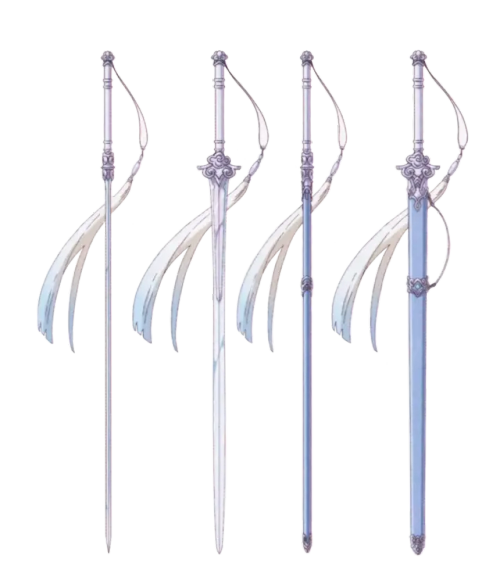
Bichen in the drama:
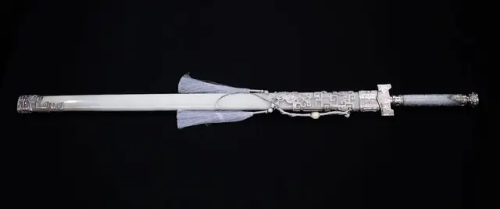
They're clearly not exactly the same. The scabbards are different, and the guards have a different shape. But these are recognizably different iterations on one theme, right? Thin jian with a white grip silver guard, light blue tassel and silver mounting accents on the scabbard.
Now this is baxia in the donghua:
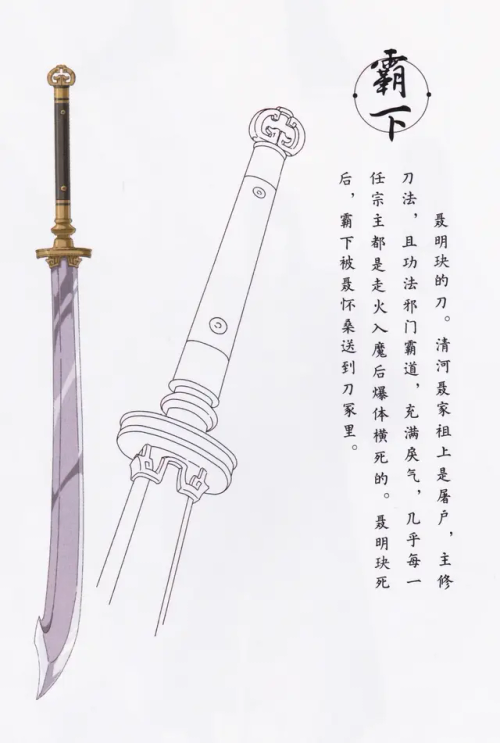
And baxia in the drama:

????????
THAT'S A COMPLTELY DIFFERENT WEAPON
it doesn't stop there either, the audio drama is kind enough to give us ANOTHER COMPLETELY DIFFERENT BAXIA

pretty! But how is that he same sword??
And when we go back to the novel, we get very little information on her appearance other than the fact that her blade is tinted red with all the blood she's absorbed. Which none of these designs incorporate.
This is not a dig on the designs itself, they're all quite gorgeous in their own right and i'm going to spend a while discussing all of them! Because isn't it fascinating how, since we know little about novel baxia beyond "saber" all of these designs ended up so different? What kinds of sabers are these, anyway?
So, a chinese aber, aka a "dao" (刀) just means a sword that has only one cutting side. As opposed to a jian, which has two.
You can see how that leaves a LOT of room for variaton.
I've actually seen some people get confused because Huaisang's saber in the untsmed is thin and quite straight, making it superficially resemble the jian more than drama!baxia, but it is still clearly a saber!

See? only one cutting blade!
This, to me looks a lot like a tang dynasty hengdao

credit to this blog for providing his image and being a great source for all this going forward.
TANGENT: during all this I found out the english wikipedia page for dao is WRONG! Ths is what they about the tang hengdao!

So that sounds like the hengdao was called that during the sui dynasty, but then, after that, started being called a peidao, right?
WRONG
I LOOKED AT THE SOURCE THEY USED AND IT SAYS THIS:


IT WAS CALLED THE PEIDOU UNTIL THE SUI DYNASTY, AT WHICH POINT IT WAS CALLED A HENGDAO. Which would carry over to the Tang dynasty. This was the source wikipedia linked! and it says something else than they say it does!
Anyone know how to edit a wikipedia article?
ANYWAY
BACK TO BAXIA
Since we're already at the drama, let's look at drama baxia: She's also straight! the general term for straight-backed saber is Zhibeidao, but that's a modern collector's term, and doesn't really say anything about which historical kind of saber baxia could be based on. Another meta i found on the drama nie sabers already went on some detail here.
I'm gonna expand on that a little: The kinds of historical straight-backed sabers we see resemble the hengdao a lot more than they do baxia. They don't go to their point as harsly as she does (she's basically a cleaver!) and they're all way skinnier.
No, my personal theory is that instead of being based on any kind of historical sword, drama!baxia is based on a Nandao.

I mean, come on, look at it!

Baxia!
The Nandao... isn't actually a historical sword. It was invented for Wushu forms. There's a really fascinating article about its conception, but that's why the swords in the images look a little thin and flimsy. Wushu swords are very flexible and light, they're dance props, not weapons to fight with. There are actual steel versions of Nandao, but they're recreations of the prop, not the other way around.
So That's one way in which Baxia differes from the Nandao: she's actually a real weapon. The other is that, as you can see above, the nandao has an S-shaped guard. Baxia doesn't. She's also much more elaborately decorated, of course. Because she's a princess.
Now: audio drama baxia!

This is much easier. with that flare at the tip?
Oh baby that's a niuweidao, all the way!

There are more sabers with that kind of curved handle, but the broad tip is really charcteristic of the niuweidao. The Niuweidao is also incredibly poplar in modern media, often portrayed as a historical sword, but it originated i nthe 19th century! And it was actually never used by the military!
That's right, the Niuweidao was pretty much exclusively a civilian weapon! That makes its use here anachronistic, but so is the nandao, and considering that the origin story of the Nie is that they use Dao intead of Jian because their ancestors were butchers, portraying them with a weapon historically reserved for rebels and common people instead of the imperial military is actually very on theme!
Finally, Donghua/Manhua baxia. These two designs are so similar I'm going to treat them as one and the same for now.

Unlike both previous baxias, The long handle makes it clear this baxia is a two-handed weapon, though Nie Mingjue is absolutely strong enough to wield her with one hand anyway. Normal rules don't count for cultivators.
Now, this is where things get tricky, because there are a lot of words for long two-handed sabers. And a lot of them are interchangable! This youtube video about the zhanmadao, one of the possible sabers this baxia could be based on, goes a little into just how confusing this can get. This kind of blade WAS actually in military use for many centuries, making it the most historically accurate of all the baxias. But because of that it also has several names and all of those names can also refer to different kinds of blades depending on what century we're in.
So here's our options: i'm going to dismiss the wodao and miandao, because these were explicitly based on japanese sword design, and as we can see manhua baxia has that very broad tip, so that won't work

(Example of a wodao. According to my sources Miaodao is really just the modern common term for the wodao, and the changdao, and certain kinds of zhanmadao... do you see how quickly this gets confusing?)
Next option: Zhanmadao.
Zhanmadao stands for "horse chopping saber" so... yeah they were anti-cavalry weapons. meant to be able to cut the legs and/or necks of horses. That definitely sounds like a weapon Nie Mingjue would wield. But if you watched that youtube video i linked above, you'll know the standardized Qing dinasty Zhanmadao looked very different from earlier versions. It was inspired by the japanese odachi, and more resembles the miandao than its ealrier heftier counteprarts.
Earlier Ming dynasty Zhanmadao on the other hand were... basically polearms. the great ming military blog spot, another wonderful source, says these are essentially a kind of podao/pudao (朴刀) which looked like this

Now that blade looks a lot like baxia, but the handle is honestly too long. Donghua!baxia straddles the line between sword an polearm a little, but while zhanmadao have been used to refer to both long-handled swords and polerarms, this was undeniably a polearm, not a sword.
If you want to know what researching this was like, I found a picture of this blade on pinterest-- labeled as a "two-handed scimitar"-- and the comment section was filled with people arguing about whether this was a Pudao, Wudao, Zhanmadao, Dadao, Guandao, or a japanese Nagita.
So... that's how it was going. This has kept me up until 2 AM multiple times.
However! Thanks to this article on the great ming military blog I found out there have historically been pudao blades with shorter handles!
Specifically, Ming dynasty military writer Cheng Ziyi created a modified version of the pudao to work with the Dan Fao Fa Xuan technixues-- aka technqiues for a two-handed saber, which would alter heavily influence Miaodao swordmanship-- thereby, as the article points out, essentially merging the cleaver-polearm type Zhanmadao with the later two-handed japanese-inspired design.

This is the illustration for the Wu Bei Yao Lue (武備要略) a Ming dynasty military manual
This blade shape in the illustration doesn't match Baxia exactly, but since it's a lengthened Pudao-like blade and we've seen above that those can match Donghua Baxia's shape, i'm gonna say that calling Baxia a Zhanmadao with a two-handed grip isn't all that innacurate!
However, because all of these terms are so intertwined, there are a dozen other things you could call her that would be about equally correct.
To show that, here's a lightning round of other potential Baxia candidates:
Dadao (大刀)

Which are generally one-handed and too short. However!
Another youtube video i found of someone training with a Zhanmadao that resembles baxia a little also calls it a "shuangshoudai dao" (雙手带 刀) shuangshou means two-handed, and while 雙手带 seems to refer to a longer handled weapon, when looking for a shuangshou dao or shuangshou dadao (双手大刀) we find a lot more baxia-resembling blades like here and here
I also found that, while the cleaver-like Dadao is strictly a product of the 20th centuy, since dadao just means big sword or big knife, it has been used to refer to loads of different weapons! Some people could've called the zhanmadao and pudao "dadao" during the Ming dynasty as well.
Another potential baxia candidate that mandarin mansion classifies as similar to the later dadao (though longer, as seen in the illustration below) is the "Kuanren Piandao"

Which piqued my interest because this diagram classifying different tpye of Dao:

Claims that a Kuanrenbiandao (diferent spelling, same sword) is the same as a modern day Zhanmadao.
(So once again, all of these terms are interchangable)
Another opton Is the Chuanmeidao/Chuanweidao (船尾刀) below you can see a diagram, based on the Qing dynasty green standard army regulation, of blades all officially classified as types of "pudao"
The top middle is the Kuanren Piandao, and bottom left is the Chuanweidao.

Both of these have a lot of baxia-like qualities.
So there you go! live action baxia is based on a Nandao, audio drama baxia is based on a Niuweidao, and Manhua/donghua baxia is some kind of two-handed Zhanmadao/Pudao/Dadao depending on how you want to look at it.
I'm honestly surprised no one has made the creative decision to portray Baxia as a Jiuhuandao, aka 9 ringed broadsword yet.
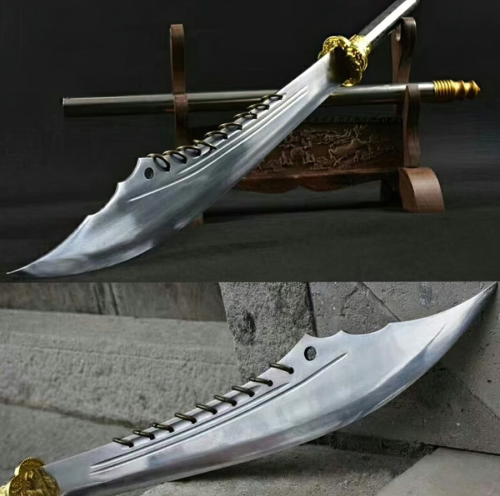
I mean look at it! Incredibly imposing. Would make for a great Baxia imo. (@ upcoming mdzs manga and mobile game: take notes!)

little doodle for twitter lmao

insp by photographer Jihoon Yang, 2020 also on twt

tender 2.2 bc something was bothering me with the lighting on the last one

t-tender 🥺

" But it doesn’t hurt, and once Lan Wangji gets used to it, he actually doesn’t mind. It feels… exciting, maybe? It feels like half of a dance, an invitation to move with Wei Wuxian through unknown steps in order to make something beautiful together. Without really thinking about it, he tries to match the steps a bit, to take Wei Wuxian’s invitation, and—"
Art inspired (loosely) by A Curse of a Different Color by nickel710

No thought Wei Wuxian in homo sweatshirt

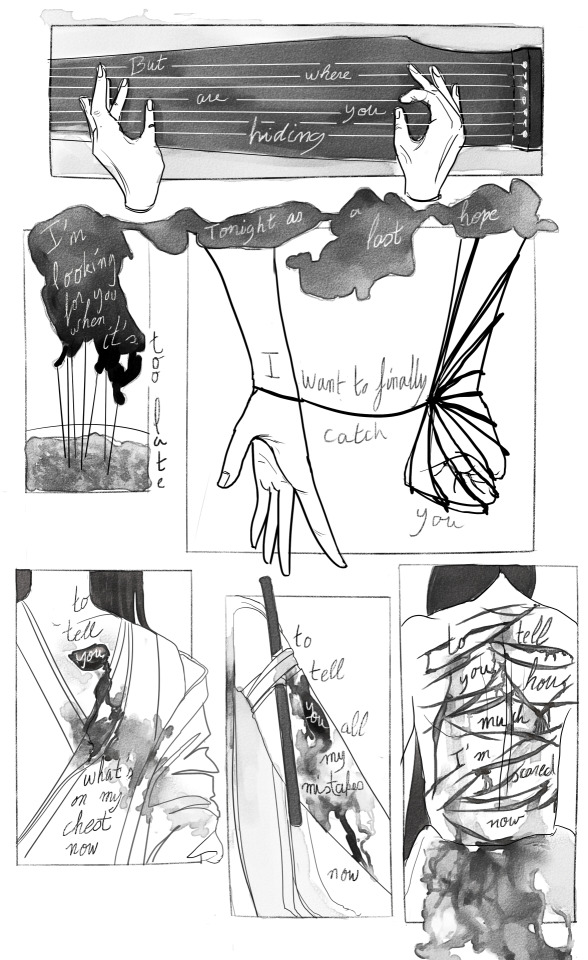


Where are you Honey?
Click for better quality
Text, extensive translators note, and general remarks with a bit of meta under the read more
Text id:
Where have you gone
I’m looking for you in the night*
This night like every night
I want to still believe you.
Embrace you this one time**
this absolute last time.
lightning strike me***
I’ll be moving on at dawn
****
But where are you hiding,
I’m looking for you when it’s too late.+
Tonight as a last hope I want to finally catch you
to tell you what’s on my chest now++
to tell you all my mistakes now
to tell you how much I’m scared now+++
to tell you how many tears I’ve shed
I’m begging you
come back to drink them. °
Here there’s everything to see
Here it’s daytime you know
you can have more than just the night.°°
You won’t ever regret if you come back to sit here
where no one knows better than me
how to look at you°°°
Translator's notes:
*night in the og text is actually 'dark'.
** I'm deliberately mistranslating here, in french "embracer" means to embrace and to kiss, but commonly it just means to kiss
*** god this gave me a tough time. French is "promis juré craché" which basically means cross my heart and hope to die. The literal translation would be "I promise, swear, spit on it" and there is a kind of gradation to it. You can say promis or promis juré by themselves. It's also a bit childlike to say the three, which I think fits well the song, someone making a desperate, almost pathetic bid to get their lover closer to them. I didn't find a good equivalent in English, and I didn't want to use "cross my heart" bc I feel like it brings up images of boy scouts. What I used is what I found to be a rough equivalent in mandarin to the french version and then retranslated to English do with that what you will.
**** I deleted a full verse! But I actually have a translation for it :
I once again got fooled,
by your sugar-coated words
and your half backed promises
lulling me to sleep too early
I'm looking for you in the night
where the stench of all this sham
ends up on the boulevards,
in our hopes and without coats.
I didn't really see a point in including it and it was just more words to illustrate, but I did like the whole sugar-coated words (words with water in french) and the literal "bastard promises" haha. Let Lan Wangji be angry and resentful in his grief 2k21.
+ Literally, it's "I'm looking for you in the too late". It is also grammatically incorrect in french but it's even more awkward in English. Also in french it's just "I'm searching for you" but I liked the "looking" motif bc I thought it paralleled well with "seeing you"/looking at you at the end
++ In french it's "to tell you what's on my heart" which is what inspired the art for this specific illustration
+++ as someone remarked in the tags scared and scarred are very close in English, sometimes stuff just works out.
° Still not satisfied with the English for this. The singer for this song actually said he didn't want the lyrics for his song written down officially because he plays on homonyms a lot. Here the word used in french both means to recount a story and to count numerically. And 'boire' (drink) much like 'croire' (believe) is kind of an odd choice to end a singing phrase with? It's not really pretty, and it feels very raw, it really annoyed me that I don't think the rawness of it comes through at all in English.
°° also really stretching the og text here. In french it's "coup d'un soir" meaning literally "one night hit" but it means one night stand. @/pumpkinpaix and @/hunxi-guilai (who you should follow bc the work they do is extremely helpful and god I imagine so time-consuming and draining) both wrote a long post about the translation of 知己 zhiji in English, which you should read but I think the main idea was "the one who understands me" would be an accurate enough translation. I was actually working on this before I found those posts but I like how "looking"/"seeing" someone in English can be used to convey understanding the person (you see me for who I really am, etc). Idk I'm just fond of how "to look at you" means both in the physical sense "I want to see you" and also, no one else will know you as I do.
°°° last TN but I missed "au grand jamais" from the original text. It's just a superlative, it kind means, like never ever in any time or world or something in that spirit. But I really like that the song ends by looking.
In the spirit of things I really wanted to say a few words about the translation ha. I think maybe the first thing that I kinda miss from the french is that eddy de pretto (the singer) has a very uh, crude? way to sing. He is known for being both from a lower-class background (in french I would say from the "cité" which wordreference translates to ghetto) and homosexual. A lot of it is french "argot", which basically means french slang, but it's very difficult to translate because my knowledge of english doesn't necessarily include that much slang, and also it just doesn't hit the same haha. A lot of words are contracted, "r'viens" "j'te cherche" etc, which carry a sense of urgency.
This is maybe turning into a Lan Wangji meta post but I think a lot (or used to) about how he had to have his character growth mostly of-screen, in the years where he had to reconcile being alive and raising a son. One of my interpretations is that Lan Wangji was probably more aware of his feelings in the first place, but when we meet him (post 13 or 16 years whatever), we meet someone who has come to terms completely about who he is as a person, what he feels etc. Like this is a man who probably has lived through some of his worst-case scenarios (his home got destroyed, the person he loved died in front of him). And I'm always thinking of what it is to try to grow and reconcile your teachings while raising a kid and mourning you know? I think that's why Honey (the song) resonated with me in that light when I listened to it, just like. God man's had a rough life.
Also, I wanted to say I'm misinterpreting the point of the song, in context Honey is. Kinda complex (there's nuance), but basically the singer is talking about his partner, who's at the time of the song sleeping with someone else. Personally, I think it's unclear if the person the singer is talking about is cheating on him or if they are just in an open relationship, but the singer overtly yearns for a deeper connection for that person.
Omg not me editing a post that's already too long for people to engage with but I forgot! what the whole point of doing a TN was! It's to show ppl how much gets lost or missed on purpose between two languages that are super close. And it's like, maybe 10 sentences! And yet I some stuff I genuinely could not translate correctly. And not only I am a native french speaker living in an English-speaking country but I've done like, actual translation before. It terrifies me sometimes to think how much is lost, and how much is added, in the translation process, which is rarely examined as even being relevant. (edit edit: it was pointed out to me that it is a very active field of research haha, I meant specifically in fandom spaces it's deffo being examined in academia)



[text : to tell you how many tears I've shed I'm begging you/ Come back to drink them. Here there's everything to see/ Here it's daytime you know/ you can have more than just the night. You won't ever regret/ if you come back to sit here / where no one knows better than me/ how to look/ at/ you.] Trans. of Honey by Eddy de Pretto
part 1 / part 2 / part 3



[Text: But where are you hiding, I'm looking for you when it's too late. Tonight as a last hope/ I want to finally catch you/ to tell you what's on my chest now/ to tell you all my mistakes now to tell you how much I'm scared now] Trans. of Honey by Eddy de Pretto
part 1 / part 2 / part 3



[text: Where have you gone / I'm looking for you in the night / This night like every night / I want to still believe you. Embrace you this one time / this absolute last time. lightning strike me/ I'll be moving on at dawn] Trans. of Honey by Eddy de Pretto
Part 1 / Part 2 / Part 3

small landscape - from reference
